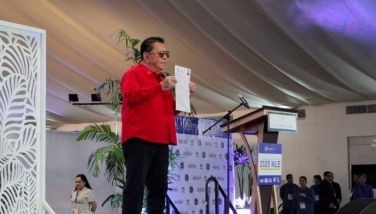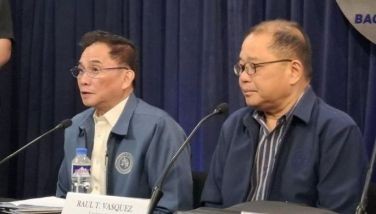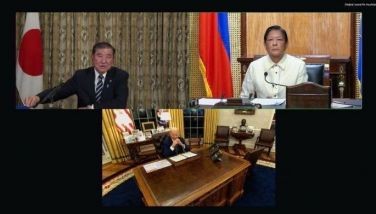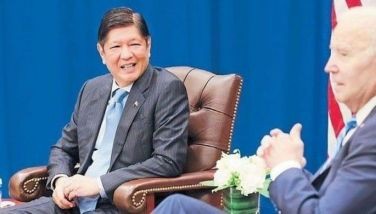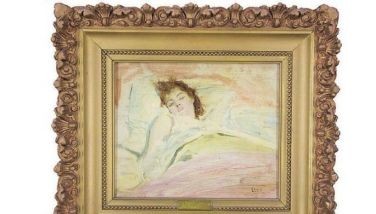House eyeing 2-tiered VAT system
February 14, 2005 | 12:00am
The House of Representatives is planning to adopt a two-tiered value-added tax system to cushion the impact of VAT increases while raising revenues for the government, a lawmaker said yesterday.
At the same time, small oil firms urged Congress to consider raising excise taxes on petroleum products, which are exempt from VAT, instead of the proposed 12 percent VAT to prevent sudden price increases.
Tarlac Rep. Jesli Lapus, chairman of the House committee on ways and means, said under the two-tiered VAT system, firms such as oil companies and independent power producers (IPPs) and processed foods such as sardines, bread, noodles and cooking oil will be levied a lower VAT rate of six percent compared to the proposed 12 percent on other products not exempt from VAT.
He said liquefied petroleum gas will remain VAT-exempt.
The proposed increase in VAT from 10 to 12 percent is now being deliberated in the Senate. The House began plenary debates last week on the proposal to lift VAT exemptions to raise additional revenue and remove what Lapus described were distortions and injustices in the system.
Through the two-tiered VAT system, "distortions in the systems are removed due to exemptions granted to oil companies, IPPs and others, yet the possible impact on consumers (is) greatly minimized," Lapus told The STAR.
He said the proposed revisions will be incorporated when the list of VAT exemptions goes through the period of amendments in the House.
The Department of Finance estimates that a six percent VAT imposed on electricity will translate to 2.67 percent for industrial consumers and 3.26 percent for residential consumers, according to Lapus.
He said that a six percent VAT on petroleum would result in higher transport fares with the minimum fare of jeepneys, taxes and buses estimated to be jacked up by three centavos, 72 centavos and 22 centavos, respectively.
Lapus said these represent a fare rate increase ranging from 1.8 to 2.4 percent, depending on the Land Transportation Franchise and Regulatory Board’s share of fuel costs.
He said the government needs to lift VAT exemptions on oil companies, (IPPs), doctors, lawyers and other sectors, saying they have been pampered for so long.
"We also want to promote fairness in the treatment of all types of businesses. We cannot bear in mind that while some sectors are being taxed and have been religiously paying taxes, others have been enjoying unwarranted privileges under the guise of exemptions," Lapus said.
He added that by removing the industries’ perks, the government is helping them regulate themselves and motivate them to be more competitive.
Independent Philippine Petroleum Companies Association (IPPCA) chairman Fernando Martinez said it will be better if the government will simply raise taxes on petroleum products instead of slapping the 12 percent VAT on them.
He said oil players have adjusted the prices of diesel oil and premium gasoline by 75 centavos and P1.50 per liter respectively, to raise excise taxes to more than the P10 billion targeted by the Arroyo administration.
Lapus said the move will result in lower fuel price hikes compared to imposing the 12 percent VAT.
The Congressional Planning and Budget Office, the House’s economic think tank, earlier estimated that if the 12 percent VAT is imposed on diesel, its price will go up from P23.41 per liter to P26.22 while premium gasoline will go up from P26.93 per liter to P30.16.
The IPPCA also warned that due to the frequent movement of oil prices, the VAT — computed as a percentage of the fuel cost — will worsen price hikes since they will be passed on.
An excise tax will remain fixed regardless of the rise in fuel prices, the group said.
The IPPCA also warned that imposing VAT on fuel products will result in an administrative nightmare since government will have to compute the tax based on thousands of transactions in each of the 4,000 gasoline stations nationwide instead of simply collecting the specific tax from the oil firms themselves.
At the same time, small oil firms urged Congress to consider raising excise taxes on petroleum products, which are exempt from VAT, instead of the proposed 12 percent VAT to prevent sudden price increases.
Tarlac Rep. Jesli Lapus, chairman of the House committee on ways and means, said under the two-tiered VAT system, firms such as oil companies and independent power producers (IPPs) and processed foods such as sardines, bread, noodles and cooking oil will be levied a lower VAT rate of six percent compared to the proposed 12 percent on other products not exempt from VAT.
He said liquefied petroleum gas will remain VAT-exempt.
The proposed increase in VAT from 10 to 12 percent is now being deliberated in the Senate. The House began plenary debates last week on the proposal to lift VAT exemptions to raise additional revenue and remove what Lapus described were distortions and injustices in the system.
Through the two-tiered VAT system, "distortions in the systems are removed due to exemptions granted to oil companies, IPPs and others, yet the possible impact on consumers (is) greatly minimized," Lapus told The STAR.
He said the proposed revisions will be incorporated when the list of VAT exemptions goes through the period of amendments in the House.
The Department of Finance estimates that a six percent VAT imposed on electricity will translate to 2.67 percent for industrial consumers and 3.26 percent for residential consumers, according to Lapus.
He said that a six percent VAT on petroleum would result in higher transport fares with the minimum fare of jeepneys, taxes and buses estimated to be jacked up by three centavos, 72 centavos and 22 centavos, respectively.
Lapus said these represent a fare rate increase ranging from 1.8 to 2.4 percent, depending on the Land Transportation Franchise and Regulatory Board’s share of fuel costs.
He said the government needs to lift VAT exemptions on oil companies, (IPPs), doctors, lawyers and other sectors, saying they have been pampered for so long.
"We also want to promote fairness in the treatment of all types of businesses. We cannot bear in mind that while some sectors are being taxed and have been religiously paying taxes, others have been enjoying unwarranted privileges under the guise of exemptions," Lapus said.
He added that by removing the industries’ perks, the government is helping them regulate themselves and motivate them to be more competitive.
Independent Philippine Petroleum Companies Association (IPPCA) chairman Fernando Martinez said it will be better if the government will simply raise taxes on petroleum products instead of slapping the 12 percent VAT on them.
He said oil players have adjusted the prices of diesel oil and premium gasoline by 75 centavos and P1.50 per liter respectively, to raise excise taxes to more than the P10 billion targeted by the Arroyo administration.
Lapus said the move will result in lower fuel price hikes compared to imposing the 12 percent VAT.
The Congressional Planning and Budget Office, the House’s economic think tank, earlier estimated that if the 12 percent VAT is imposed on diesel, its price will go up from P23.41 per liter to P26.22 while premium gasoline will go up from P26.93 per liter to P30.16.
The IPPCA also warned that due to the frequent movement of oil prices, the VAT — computed as a percentage of the fuel cost — will worsen price hikes since they will be passed on.
An excise tax will remain fixed regardless of the rise in fuel prices, the group said.
The IPPCA also warned that imposing VAT on fuel products will result in an administrative nightmare since government will have to compute the tax based on thousands of transactions in each of the 4,000 gasoline stations nationwide instead of simply collecting the specific tax from the oil firms themselves.
BrandSpace Articles
<
>
- Latest
- Trending
Trending
Latest
Trending
Latest
Recommended
















